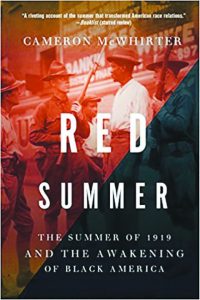Review by Joseph P. Tartaro | Executive Editor
 RED SUMMER; The Summer of 1919 and the Awakening of Black America, by Cameron McWhirter. Hardcover © 2011, Paperback © 2012. Published by St. Martin’s Press, New York, NY. 352 pages, news press photos insert. Available in hardcover, paperback and Kindle. Prices from $10 to $15, depending on format.
RED SUMMER; The Summer of 1919 and the Awakening of Black America, by Cameron McWhirter. Hardcover © 2011, Paperback © 2012. Published by St. Martin’s Press, New York, NY. 352 pages, news press photos insert. Available in hardcover, paperback and Kindle. Prices from $10 to $15, depending on format.
The struggle for equal rights under the constitution for people of color dates back before the Civil War, and firearms have always played a key part, especially when local, state and federal governments turned a blind eye to the inequities and violence.
While Harriett Tubman is remembered for her 19th century civil rights struggle, you will find pictures of her fully armed. So too were many of those who protected the non-violent civil rights movement of the 1960s.
Red Summer is a book that shows why people of color had to take up arms as it recounts the history of America’s deadliest episode of race riots and lynchings. This is not a firearms book as such, but it does explain why people yearning to be free and enjoy their full equal rights need to be able to acquire and possess arms. It is significant that my copy of Red Summer was given to me by the president of the Dorie Miller Rifle & Pistol Club after I attended a study session conducted in a Buffalo, NY, public library.
The ideas in this book are essential to understanding the new wave of firearms ownership among people of color, especially given the violence that pervades many urban communities today, and the meteoric growth of the recently formed National African-American Gun Association (naaga.org).
McWhirter is a staff reporter for The Wall Street Journal. He graduated Phi Beta Kappa, summa cum laude from Hamilton College, where he majored in history. He earned a masters from Columbia University’s Graduate School of Journalism and has worked for several news organizations including The Atlanta Journal-Constitution and The Detroit News. He has been awarded a Thomas J. Watson Fellowship for research in Eritrea and the Sudan, and a Nieman fellowship at Harvard University, where he conceived this book, and researched the 1919 period. (More online at cameronmcwhiter.com.)
An outline of the book would read like the following:
After World War I, black Americans fervently hoped for a new epoch of peace, prosperity, and equality. Black soldiers, veterans of combat in France, believed their participation in the fight to make the world safe for democracy finally earned them rights they had been promised since the close of the Civil War. Their expectations were heightened by the way people in France had treated them as equals in “liberté, équalité and fraternité”
Instead, an unprecedented wave of anti-black riots and lynchings swept the country for eight months. From April to November of 1919, the racial unrest rolled across the South into the North and the Midwest, even to the nation’s capital. Millions of lives were disrupted, and hundreds of lives were lost. Blacks responded by fighting back with an intensity and determination never seen before.
Red Summer is the first narrative history written about this epic encounter. Focusing on the worst riots and lynchings―including those in Chicago, Washington, D.C., Charleston, Omaha and Knoxville―Cameron McWhirter chronicles the mayhem, while also exploring the first stirrings of a larger civil rights movement that would transform American society forty years later.
It’s now almost 100 years after that violent period of social unrest in which the government failed to address the violence against blacks, failed to enact an anti-lynching law, and failed the black aspirations for equal rights.
This book, relying heavily on news reports of the period, covers a time in our history you won’t find in many history books.



